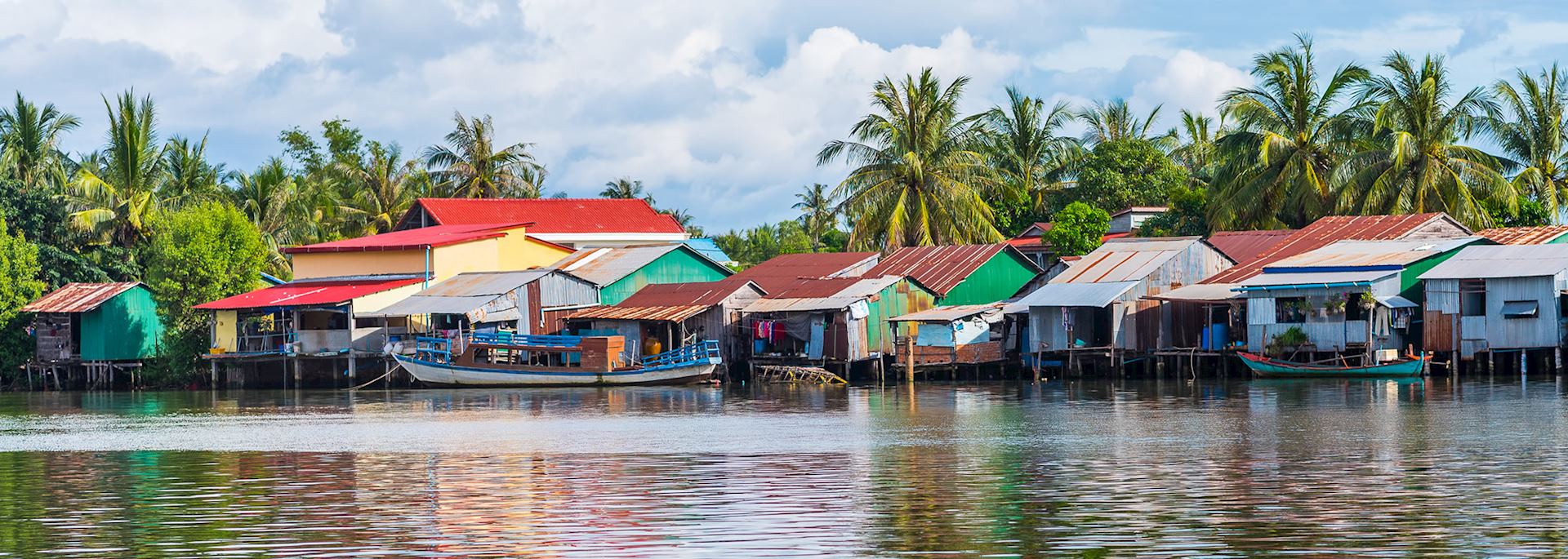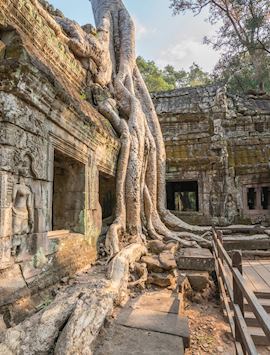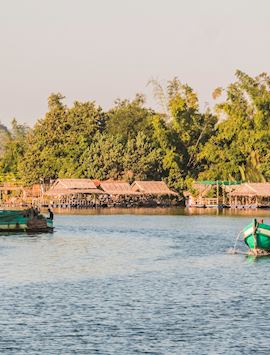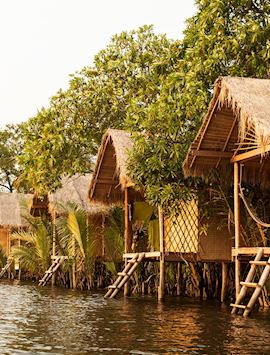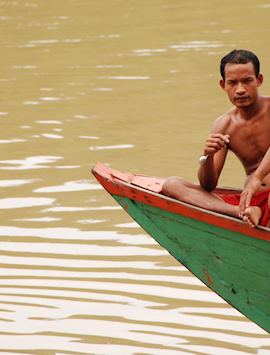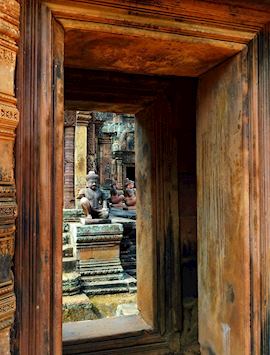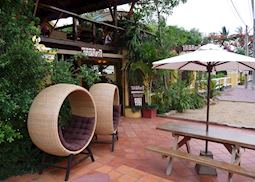Jump to:
Kampot is a collection of peach and faded-yellow French-colonial shopfronts running alongside the Teuk Chhou River. The orderly boulevards are trimmed with trailing vines, tiny cafés and the occasional corner shop. This was once Cambodia’s main port and, as you drive into the city, you’re hit with a multi-story-size clue to the main source of commerce here now: a towering statue of a spiky durian fruit.
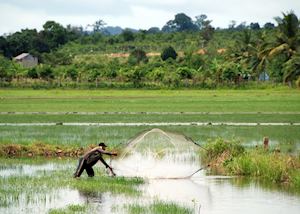 The region around Kampot grows much of Cambodia’s fruit, including the love-or-loathe-it durian. Pineapple, mangosteen and lychee plantations surround the city and, coming from Phnom Penh, you also pass neat, rectangular salt pans (and a number of often-unmarked killing fields used by the Khmer Rouge). You’re also close to Kep, Cambodia’s first beach resort, which was created when the French imported sand to create a beach in 1908.
The region around Kampot grows much of Cambodia’s fruit, including the love-or-loathe-it durian. Pineapple, mangosteen and lychee plantations surround the city and, coming from Phnom Penh, you also pass neat, rectangular salt pans (and a number of often-unmarked killing fields used by the Khmer Rouge). You’re also close to Kep, Cambodia’s first beach resort, which was created when the French imported sand to create a beach in 1908.
The name Kampot is also synonymous with pepper, which has been grown here for the past 1,000 years and more. When the city opened its doors to European merchants in the mid-1800s, the pepper trade boomed and French chefs declared Kampot pepper the finest in the world. The Khmer Rouge halted production, but the land has been reclaimed by farmers eager to reinstate this slow-to-mature crop.
Many farms are open to visitors, including La Plantation, a certified organic pepper plantation backed by the Damrei Mountains. You can spend an entire day here, introducing yourself to traditional Cambodian specialties in a cooking lesson, and taking a guided tour of the farm. Sit down in one of the stilted Khmer houses for a tasting session to try all 11 varieties of pepper grown here, including the eye-wateringly intense long pepper.
Back in town, you can enjoy a leisurely lunch at one of the many cafés, which serve everything from Kampot-pepper-infused local signatures to French-inspired dishes (a small community of French expats live here). Hire a bicycle to explore the surrounding countryside or paddle along the river in a kayak or by paddleboard.
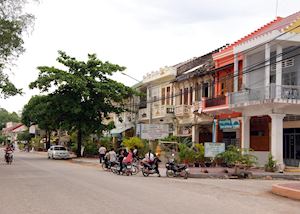 In the evenings, any pretence of quaint French-colonialism is lost as the riverside transforms itself with as many fluorescent lights as it can fit, wrapped around the surrounding bridges and promenades. Boats, decked out in more neon lights than Times Square at Christmas, cruise along the river, making the most of the intense violet-pink sunsets. They don’t entertain the tourists — you’ll be surrounded by Kampot locals and Cambodian visitors basking in a relaxed, celebratory atmosphere.
In the evenings, any pretence of quaint French-colonialism is lost as the riverside transforms itself with as many fluorescent lights as it can fit, wrapped around the surrounding bridges and promenades. Boats, decked out in more neon lights than Times Square at Christmas, cruise along the river, making the most of the intense violet-pink sunsets. They don’t entertain the tourists — you’ll be surrounded by Kampot locals and Cambodian visitors basking in a relaxed, celebratory atmosphere.
The central Kampot Night Market is a tight grid of clothes stalls and food vendors selling freshly caught river shrimp. You can also sit down for a chilled beer or pick up some Kampot pepper. A 15-minute walk or short taxi ride north is the Bokor Night Market, where you’ll find a fluorescent-lit food court, roller-skating park and outdoor cinema.
Best time to visit Kampot
With cooler, kinder temperatures, a gentle breeze and few showers, November to February is the best time to travel to Kampot. April and May also see few showers, but temperatures can top 104°F (40°C). The rainy season starts in June. If you’re prepared to weather a few short, sharp showers and the occasional storm, you’ll be rewarded with a verdant landscape at a quieter time. The rains tend to taper off in October, which can be a good-value time to travel.
who's been there
-
617-223-4521617-223-4150
- Make an inquiry
Suggested itineraries featuring Kampot
Our itineraries will give you suggestions for what is possible when you travel in Kampot, and they showcase routes we know work particularly well. Treat them as inspiration, because your trip will be created uniquely by one of our specialists.
Places near Kampot
- Kep 13 miles away
- Sihanoukville 47 miles away
- Phnom Penh 84 miles away
- Koh Kong 108 miles away
- Kratie & Chhlong 181 miles away
- Battambang 185 miles away
- Siem Reap 192 miles away
- Temples of Angkor 196 miles away
- Sen Monorom 241 miles away
- Mondulkiri 244 miles away
- Banteay Chhmar 251 miles away
- Preah Vihear 265 miles away
- Ratanakiri 288 miles away
- Ban Lung 289 miles away
Photos of Kampot
Accommodation choices for Kampot
We've selected a range of accommodation options for when you visit Kampot. Our choices usually come recommended for their character, facilities and service or location. Our specialists always aim to suggest properties that match your preferences.
-
![Rikitikitavi, Kampot]()
Rikitikitavi
Kampot
